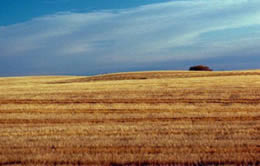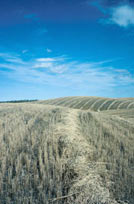THROWING A MONKEY WRENCH INTO THE INDUSTRIAL FARM MACHINE
The Environmental Cost and Unsustainability of Industrial Agriculture
Most of us in the US live in The Land of Plenty, at least as far as food is concerned. There may be a few sugar addicts that would prefer to live in The Land of Good 'n' Plenty, but generally we like the fact that we have cheap, plentiful food.
We're sorry to have to report, however, that not all is well with the "industrial" food system that emerged in the 20th century.
 Because farming and food production are such important parts of our survival, and because farming plays a key role in many aspects of pollution, biodiversity, animal welfare, and human rights issues, we wanted to take a more in-depth look at the situation.
Because farming and food production are such important parts of our survival, and because farming plays a key role in many aspects of pollution, biodiversity, animal welfare, and human rights issues, we wanted to take a more in-depth look at the situation.
Today we begin a 4-part series of guest articles by Skip Spitzer of Pesticide Action Network North America that will discuss the downsides of industrial agriculture. The articles have been excerpted, with permission, from PANNA's Global Pesticide Campaigner, volume 13, number 2.
~ ~ ~
Industrial Agriculture and Corporate Power, pt 1
by Skip Spitzer, Pesticide Action Network North America
Within just the past 50 years, industrial agriculture has become the dominant model for producing food. Instead of small, family-oriented farms raising a variety of crops and animals, industrial agriculture is based on large-scale, machine- and chemical-intensive farms specializing in a single animal product or hybrid high-yield crop. Harvests have become commodities typically sold to specialized firms for storage, processing, distribution, manufacture and marketing, domestically and internationally.
Industrial farming fundamentally erodes the ecological basis of cultivation and creates crops that are especially vulnerable to weeds, insects and disease.
 Single-crop farming precludes beneficial crop interactions, abandons complimentary relationships between plant cultivation and animal husbandry (e.g., manure used for fertilization), limits fertility-enhancing crop rotations, provides uniform targets for pests, and undermines beneficial soil organisms, pollinators and natural pest predators.
Single-crop farming precludes beneficial crop interactions, abandons complimentary relationships between plant cultivation and animal husbandry (e.g., manure used for fertilization), limits fertility-enhancing crop rotations, provides uniform targets for pests, and undermines beneficial soil organisms, pollinators and natural pest predators.
Modern hybrid plant varieties deliberately emphasize economic traits (such as yield) over survivability traits (such as disease resistance). Thus, industrial crops tend to be vulnerable to pests and require synthetic fertilizers and pesticides, the overuse of which accelerates the development of pests' resistance to the pesticides, kills beneficial "predator" insects, and further erodes the natural fertility of the soil by killing beneficial soil organisms.
Additional soil problems associated with the industrial food system include nutrient depletion, hyper-salinity, bad pH, chemical and animal-waste contamination, and erosion. In the last 40 years nearly one third of the world's arable land has been lost.
Chemical inputs (fertilizers and pesticides) pollute the air and water; kill fish, birds, insects and other wildlife; and deplete the planet's protective ozone layer. Massive use of irrigation has depleted aquifers. Farm machinery, long-distance transport, and manufacture of farming chemicals consume vast amounts of fossil fuels. US agriculture uses ten fossil-fuel calories for each single food calorie produced.
The widespread adoption of a relatively few commercially successful crop varieties has led to the loss of an estimated 75% of the genetic diversity in agriculture in the past 100 years. Now genetically engineered crops pose unprecedented risks of irreversible genetic contamination.
| Pesticide Action Network North America is the North America component of the broader Pesticide Action Network, a network of over 600 participating nongovernmental organizations, institutions and individuals in over 60 countries working to replace the use of hazardous pesticides with ecologically sound alternatives. |
|
End of Part 1
~ ~ ~
Wow, that's a lot of downsides! The supporters of industrial farming would likely argue that, despite the above downsides, the chemical-based monocropping approach is the only way we can feed the world's rising human population. But that's simply not so—studies have shown non-chemical, multi-crop approaches to be superior in terms of yield per acre. Additionally, many of the costs associated with industrial farming, such as pollution of air, water, land and food—and associated human health problems—are not accounted for in the prices of the products.
So why are we doing it the wrong way? We'll talk about that in the next Eco-Logical.
Other parts in this series: pt 1 | pt 2 | pt 3 | pt 4
Get Grinning Planet free via email
|


